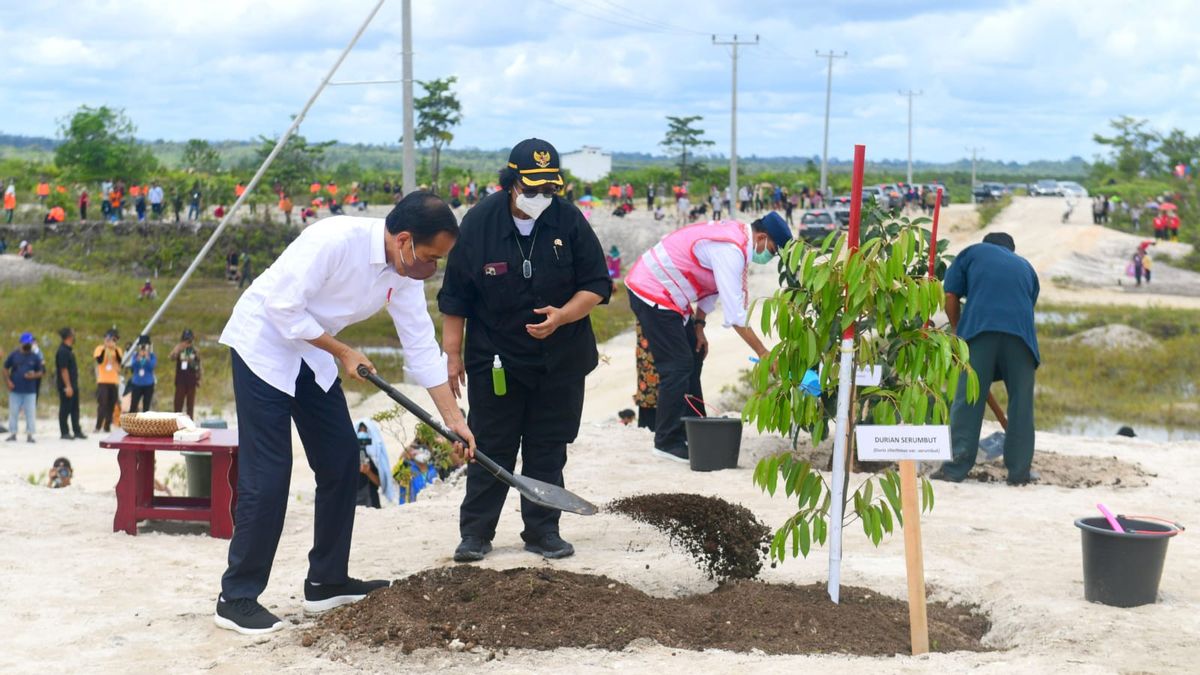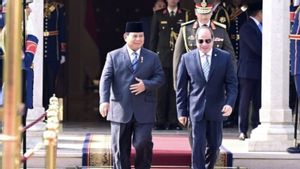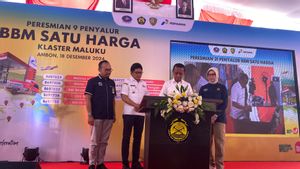JAKARTA - President Joko Widodo (Jokowi) revealed his plan to tackle flooding in Sintang Regency, West Kalimantan. One of them will be re-greening the watersheds (DAS) in the affected areas. The government knows that trees are important to prevent flooding. They understand that well. But why do you want to ratify Law Number 11 of 2020 concerning Job Creation (UU Ciptaker) which is considered to be able to exploit forests?
When he visited Sintang Regency on December 8 yesterday, Jokowi took the time to plant various types of trees. During the visit, the president ordered the Ministry of Environment and Forestry (KLHK) together with large companies to build a nursery. All of this is done in order to create a revitalization of the watershed area.
"We will order the Ministry of Environment and Forestry as well as big companies here to build a nursery so that reforestation can run again," Jokowi said as quoted from the Presidential Secretariat's YouTube.
The step of re-greening in the watersheds around the Kapuas River and Melawi River is one of the government's steps to deal with the flood problem in Sintang Regency, South Kalimantan. Jokowi agrees that this disaster occurred not because of extreme rain but caused by environmental damage.
"This happened firstly, there was extreme rain and secondly, we need to overcome this, namely the damage to watersheds, damage to rain catchment areas," said the former governor of DKI Jakarta. "This is what we will prepare, namely replanting, tree planting, reforestation of areas around the Kapuas and Melawi rivers."
Meanwhile, to cope with flooding in the short term, he said the government is currently making geotubes filled with sand. "We hope that in the short term we can reduce the existing flooding."
Environmental crisisThe Kapuas watershed stretches from Kapuas Hulu Regency to Pontianak City which crosses a number of other regencies, namely Sintang Regency, Melawi Regency, Sekadau Regency, Sanggau Regency, and Landak Regency. This river, in addition to its great benefits, also saves various problems like tangled threads. One of them is related to the rise of illegal mining. At least, the tributaries of the Kapuas River, namely the Meliau and Kalaman rivers, are among the two most damaged areas.
As quoted by Kompas.id, in Hurung Pukung Village, Kapuas, illegal gold mines can be easily found on the main road that is the main access for Hurung Pukung Village. At least in 2020 hundreds of miners take turns entering the area.
Both the Meliau and Kalaman rivers, before being mined, were a source of fish for the surrounding community. But because most people are more tempted by mining, the rivers are also being mined until they are damaged.
In a day miners can operate 12-14 hours per day. They use a traditional kato lift tool that functions to suck sand in holes previously dug with excavators. After being sucked, there is a musk device whose function is to separate water and other materials. In this case, the miners use mercury or mercury obtained from the owner of the capital.
The Head of Hurung Pukung Village, Sinarti, explained to Kompas.id that illegal mining in his village had started in the 1970s. According to him, gold mining has become a livelihood in his area.
"Mining is indeed a livelihood here. Not only here, but throughout this sub-district," said Sinarti.
Regarding control, the West Kalimantan Regional Police did not stand idly by. They have done operations to control gold mining without a permit (PETI) many times. However, it seems that it is difficult to put in order.
As quoted by Mongabay, the term PETI is given to non-governmental miners who do not have government permits. These activities often do not pay attention to aspects of environmental damage and health.
A 2013 United Nations Environmental Program (UNEP) report identified the small-scale gold mining sector (PESK) as the main contributor to 37 percent of mercury emissions. East Asia and Southeast Asia contributed to the spread of mercury reaching 39.7 percent. Indonesia is also in the red zone for the circulation and use of mercury. Every year 200 tons of mercury is released (released) into the air, soil and waters.

In an effort to overcome these environmental problems, it is necessary to have synergy from various sectors. Especially in terms of law enforcement. But unfortunately, in terms of regulations, the government is considered backward in dealing with environmental issues with the passing of Law Number 11 of 2020 concerning Job Creation (UU Ciptaker).
The Critical Notes published by the Faculty of Law, Universitas Gadjah Mada (2020), for example, assesses that there are controversial articles in the Ciptaker Law. In a note quoted by VOI, one of the controversial articles is Article 36 point 2, regarding the amendment to Article 18 of the Forestry Law. This article is considered to legitimize the exploitation of forest resources that does not take into account the carrying capacity of the environment, because it says that entrepreneurs do not have to conserve forests at least 30 percent of the area of river watersheds and/or islands.
"By looking at the investment narrative in the Ciptaker Law, it can actually be guessed that apart from being a legalization for the rate of exploitation in eight areas that are already below the minimum area of forest area that must be maintained, it is also to loosen restrictions on the exploitation of forest areas in other provinces in Indonesia. outside Java, Bali and Lampung," he wrote.
Jokowi understands very well what must be done to revitalize the watershed area. Especially after the flood that hit at least 12 sub-districts in Sintang Regency, West Kalimantan. But why did the government insist on signing the Copyright Act?
Political observer from Al Azhar University Indonesia, Ujang Komarudin, called the government's attitude a policy anomaly. "That is what is called a policy anomaly or a policy paradox," Ujang told VOI.
According to Ujang, if Jokowi has a concept of forest reforestation, then he should not insist on legitimizing forest exploitation as enshrined in the Ciptaker Law. "If Jokowi has the concept of reforestation or reforestation of forests, then he should not insist on legitimizing exploitation in the problematic Ciptaker Law. A great leader must be in harmony between words and actions."
"We all support Jokowi's reforestation program. However, forest exploitation should also not be allowed. Due to natural damage, disasters occur everywhere," he concluded.
*Read other information about the COPYRIGHT WORK Law, read another interesting article from Ramdan Febrian Arifin.
Other BERNASThe English, Chinese, Japanese, Arabic, and French versions are automatically generated by the AI. So there may still be inaccuracies in translating, please always see Indonesian as our main language. (system supported by DigitalSiber.id)








